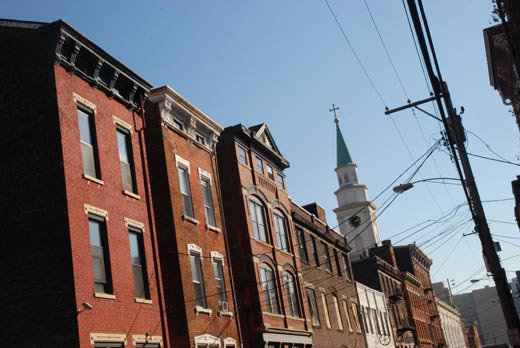
A program has been in the works for more than one year to identify the condition and ownership of Over-the-Rhine's building stock, but more funding is needed to make the project a reality.
The Over-the-Rhine Land Use Monitoring Informational System (OTR LUMIS) would be a publicly-accessible database that would include such information as the number and types of buildings, building uses, locations, conditions, value and cost, and ownership.
While doing research for
Over-the-Rhine Community Housing, Sarah Allan found that, even though the neighborhood's comprehensive plan calls for the monitoring of the mix of affordable housing, no one was updating the data.
The idea of mapping building rents and ownership grew into a neighborhood historical inventory that could be easily accessible by all Over-the-Rhine stakeholders, and Allan joined with
Over-the-Rhine Foundation executive director Mike Morgan to form a steering committee.
Both Allan and Morgan agree that the challenge is in creating a database that is easily updatable, but, once completed, it will create a vision of how the neighborhood has changed over time – making planning discussions much more intelligent.
And with so many of the neighborhood's former commercial buildings converted to residential use, Morgan says that OTR LUMIS could tell them how much commercial space they can create by re-opening these storefronts.
"It would make Over-the-Rhine an area with a level of detailed land analysis not duplicated in any neighborhood of its size in America," he says.
A small pilot study, which utilized assistance from the University of Cincinnati's
Department of Geography and the
School of Planning, revealed that pinpointing a building's ownership created the most difficulty.
Allan says that it's been most problematic for some of the lower-rent buildings that aren't part of a traceable federal subsidy program, which is why neighborhood citizens have to be part of the process.
"They know the neighborhood, and most know the building owners and even the buildings' histories," she says.
Allan and Morgan would like to launch the project neighborhood-wide this April.
"The pilot project was very helpful, because it shows that it can work in practice," Allan says. "Right now, it's just the funding."
Writer:
Kevin LeMasterSources: Sarah Allan, project manager, Over-the-Rhine Community Housing; Mike Morgan, executive director, Over-the-Rhine Foundation
Photography by Scott Beseler
Enjoy this story?
Sign up for free solutions-based reporting in your inbox each week.